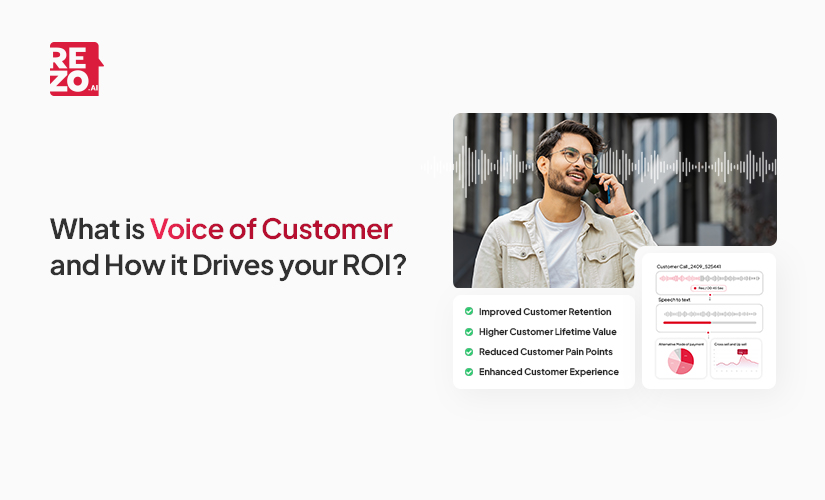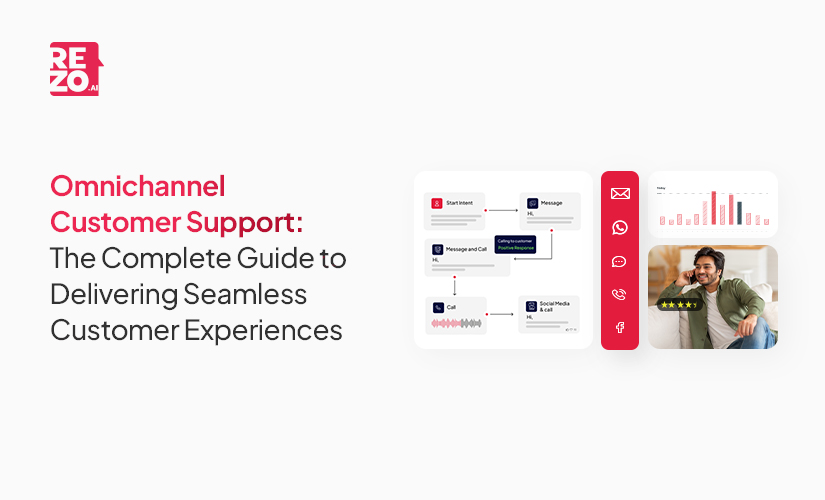
AI Voice Agents: What is it, How It Works, Applications

AI Voice Agents: What is it, How It Works, Applications


The last phone call you had with customer rep, chances are you were never speaking with a human at all.
AI is now becoming so advanced that many customers are now finding it hard to tell the difference between an AI Agent or a human agent. Industry leaders are actively seeing this changing trend and adapting their strategies accordingly.
From handling routine queries to scheduling appointments for customers, Voice AI agents are taking on more complex interactions with impressive efficiency.
In this guide, we'll break down what Conversational AI agents are, how they work, and what benefits they can offer to an enterprise. You'll get to know the real-world applications across industries and get answers to common questions about implementing this technology in your business.
Introduction to AI Voice Agents
AI voice agents are a type of artificially intelligent technology that can understand and respond to voice-based interactions. They are designed to provide a seamless and personalized experience for customers, and can be used to automate routine tasks, improve customer engagement, and enhance customer service.
Voice AI agents use natural language processing (NLP) and machine learning algorithms to understand and respond to customer inquiries, and can be integrated with existing phone systems and contact centers to provide a unified customer experience.
What are AI Voice Agents?

AI Voice Agents are digital assistants that can hear you, understand what you’re saying, and respond to you with a natural-sounding voice, all in real time.
Unlike old IVR systems that make you press buttons, AI Voice Agents can understand everyday language and maintain natural conversations. They’re much more advanced than basic chatbots that only process text, and far more flexible than old legacy systems with their rigid menu options.
These agents can make human-like voice interactions, enabling natural conversations similar to speaking with a real person.
These agents work through three core technologies:
- Automatic Speech Recognition (ASR): Converts your spoken words into text so the computer can understand what you said.
- Natural Language Processing (NLP): Interprets what you mean, not just what you said.
- Text-to-Speech (TTS): Converts back the answers from text back into speech with human like flow.
AI voice agents work by leveraging these technologies to enhance customer interactions and streamline operations across various industries. These systems are now changing how businesses handle customer interactions and how we all access information and product related support in our daily lives.
What is the difference between voice bot and IVR?

At first glance, both AI voice bots and IVR systems appear to serve the same purpose which is automating customer interactions over the phone. However, the similarities end there.
While IVR systems were once the go-to solution for automating customer service, their limitations have now become a disadvantage against the competitor, particularly for companies handling complex queries and maintaining customer relationships.
AI voice agents not only streamline communication and improve efficiency but also enable human agents to save time and make fewer mistakes compared to traditional IVR systems.
Inside AI Voice Agents: How Do They Work?
Now that we’ve explored what voice bots are and how they streamline business operations, it’s clear that AI voice agents are transforming customer interactions. Defining how the AI responds to users is crucial for ensuring a natural and effective interaction, thereby enhancing customer engagement and support management.
If you’re thinking about implementing this technology for your business, understanding the fundamentals will help you make informed decisions.
Let’s break down how these intelligent systems actually work!
The 5-Step Process Behind AI Voice Agents

1. Audio Capture
When a customer speaks, the system first captures their voice. This raw audio is immediately processed to filter out background noise and prepare it for analysis.
2. Speech Recognition
The system converts speech to text using advanced algorithms. This technology has improved dramatically in recent years, now accurately recognizing diverse accents, industry-specific terminology, and even speech with background noise. Additionally, the platform supports multiple languages, enabling it to handle real-time customer interactions across diverse linguistic groups. For businesses, this means fewer misunderstandings and smoother customer interactions.
3. Natural Language Understanding
This is where real intelligence happens. The system analyzes the text to determine:
- What the customer wants (Intent)
- Important details in their request (Entities)
- The context of the conversation
Understanding customer sentiment is crucial for tracking service quality and optimizing interaction processes. By measuring customer emotions and responses, businesses can deliver more tailored and efficient services.
For example, when a customer asks, “What’s the status of my order?” the system recognizes they want order information and will need to identify which specific order.
4. Dialogue Management
The dialogue manager maintains the conversation flow, keeping track of what’s been discussed and determining appropriate responses. It can access your business systems to retrieve information or perform actions like scheduling appointments, processing returns, or updating customer records.
By integrating with CRM systems, the dialogue manager can provide personalized responses, utilizing customer history to create tailored experiences for repeat customers.
5. Response Generation
Finally, the system creates a natural-sounding reply using text-to-speech technology. Modern voice agents sound increasingly human-like, with appropriate pacing, intonation, and even emotional nuances that create a comfortable experience for customers. These advancements enable human conversations, enhancing customer interactions by providing natural and personal experiences.
Benefits of Implementing AI Voice Agents for Business

AI voice agents offer substantial benefits that can transform your customer service operations and business outcomes. As consumer demands evolve towards faster, personalized, and more convenient service, businesses must leverage these technologies to meet rising customer expectations. Here’s how they can create value for your organization:
Ensuring the secure handling of sensitive data is crucial for maintaining customer trust. Clear boundaries and robust data protection measures are essential to prevent compliance violations and significant loss of trust, especially in sensitive sectors like banking.
Enhanced Customer Experience
AI voice agents are available 24/7, providing instant answers without the frustration of long wait times or being placed on hold. They use natural language and can recognize emotional cues, making interactions feel genuine rather than robotic. By understanding accents, languages, and conversational styles, they create a more inclusive experience for diverse customers. These technologies benefit both businesses and customers alike, enhancing efficiency and service speed.
According to McKinsey, implementing AI at scale could increase customer service productivity by 30% to 50%. This translates directly to faster resolution times and more satisfied customers. Effective use of customer service automation software ensures that every customer interaction is both precise and beneficial, allowing voice agents to improve over time.
Operational Efficiency
By handling routine tasks like appointment scheduling, order processing, and status updates, AI voice agents free your human agents to focus on complex, high-value interactions. These systems can handle high call volumes without performance degradation, maintaining consistent service quality even during peak hours. Additionally, AI voice agents efficiently manage surges in call volume, reducing the need for hiring and training new staff, and cutting down operational costs while enhancing customer support.
Integration with your backend systems allows AI agents to access real-time data, delivering accurate, instant responses while minimizing errors. This is particularly valuable during growth periods when scaling human teams would be cost-prohibitive. Moreover, AI calling agents can manage high volumes of inbound calls autonomously, turning these calls into opportunities and relieving human representatives from repetitive tasks.
Data-Driven Insights
AI voice agents collect valuable customer data during interactions, uncovering patterns and insights that can refine your business strategies. For example, if many customers call about issues with a new feature, the AI voice agent can detect this spike in complaints and alert your team immediately.
AI voice agents are enhancing customer experiences in various sectors such as sales and customer service by streamlining operations and providing support, thereby improving overall customer interactions.
These insights enable data-driven decision making that helps improve products, services, and overall customer experience`.
Financial Benefits
Cost Savings:
- AI voice agents automate repetitive tasks, reducing staffing requirements and labor costs.
- Long-term ROI comes from reduced operational expenses and improved service efficiency.
AI voice agents also enhance sales through automated outbound calls, efficiently managing these calls to qualify leads, schedule callbacks, and improve overall productivity without human intervention.
Revenue Growth:
Proactive engagement through cross-selling or upselling during interactions can increase average order value. AI voice agents can deliver personalized experiences by providing tailored, empathetic responses, enhancing customer interactions, and service quality.
High containment rates (issues resolved without human intervention) enhance operational efficiency.
According to Forbes, 60% of business owners believe AI implementation will increase their company’s productivity.
AI Voice Agents Applications Across Industries

AI voice agents are transforming operations across numerous sectors. These technologies can handle phone calls by automating voice interactions, efficiently managing both inbound and outbound calls, and facilitating real-time customer interactions without the need for human input.
Here are some of the most effective applications:
AI-assisted call management solutions can answer incoming calls, route them to the appropriate personnel, schedule appointments, and enhance customer interactions through automation, thereby improving efficiency and support for teams.
Customer Service
- Handling FAQs: AI voice agents provide quick answers to common questions about products and services, reducing workload for human agents
- Technical Support: They guide customers through troubleshooting processes for connectivity problems, device setup, or software errors
- Customer Feedback: Collecting and analyzing customer satisfaction data through automated surveys
Healthcare
- Appointment Management: Handling scheduling, cancellations, and rescheduling to streamline the experience for patients and providers
- Medication Reminders: Sending prescription refill notifications and treatment adherence reminders
- Initial Symptom Assessment: Gathering preliminary information before human medical staff involvement
An AI virtual agent can significantly enhance these processes by understanding regional dialects and variations in language. It can recognize differences in accents, slang, and specific terminology across different English and Spanish dialects, ensuring a personalized interaction that transcends generic translation tools.
Financial Services
- Account Inquiries: Providing balance information and transaction history
- Payment Processing: Handling billing questions and facilitating payments
- Fraud Alerts: Notifying customers of suspicious activity and taking immediate protective actions
Ensuring the secure handling of sensitive data is crucial for maintaining customer trust, especially in financial services, where compliance violations can lead to significant repercussions.
Travel and Hospitality
- Reservation Services: Helping customers book hotels and flights for smooth travel planning
- Itinerary Management: Providing updates on flight status and accommodation details
- Local Recommendations: Offering personalized suggestions for activities and dining
AI voice agents also overcome language barriers by providing real-time translation and multilingual support, enabling seamless communication between customers and support teams who speak different languages.
Retail
- Order Status Updates: Informing customers about shipment tracking and delivery estimates
- Product Recommendations: Using customer data to suggest products based on preferences and purchase history
- Return Processing: Guiding customers through return procedures and refund status
AI voice agents play a crucial role in meeting rising customer expectations by providing faster, personalized, and more convenient service.
Designing AI Voice Agent Conversations
Designing AI voice agent conversations requires a deep understanding of customer needs and behaviors. AI voice agents can be designed to provide personalized interactions, accurate responses, and instant answers to customer queries. They can also be used to support multiple languages, making them an ideal solution for businesses with a global audience. When designing AI voice agent conversations, it’s essential to consider the brand’s voice, tone, and language to ensure that the AI voice agent aligns with the company’s overall brand identity. Additionally, AI voice agents can be designed to handle high call volumes, reducing the need for human intervention and minimizing operational costs.
How to Implement AI Voice Agents in Your Business

Implementing AI voice agents requires careful planning and execution. Integrating voice AI platforms with existing systems is crucial to ensure a seamless user experience. This integration allows for efficient management of customer interactions and data, enabling the voice AI agents to deliver more personalized service and enhance overall operational effectiveness.
Here’s a structured approach to ensure success: SIP trunking is essential for connecting existing phone systems and numbers, enabling dynamic integrations that route customer data to various platforms like CRMs and calendars.
Step 1: Define Your Strategy
Start by identifying specific goals for your AI voice agent implementation:
- Which customer service processes need improvement?
- What metrics will you use to measure success?
- Which channels will your voice agent support?
A conversational AI platform, with its feature-rich design, can efficiently handle real-time customer interactions, making it a robust solution for diverse industries.
Create a roadmap that aligns with your overall business objectives and customer experience strategy.
Step 2: Build Your Knowledge Base
Gather the information your AI voice agent will need:
- Frequently asked questions and answers
- Product details and specifications
- Company policies and procedures
- Common customer scenarios and appropriate responses
Additionally, ensure that the AI voice agent aligns with your brand's voice to create personalized and engaging interactions with customers. This will help maintain a consistent tone and style that resonates with your brand, enhancing the overall customer service experience.
This knowledge base will be crucial for training your system to respond accurately.
Step 3: Develop and Train Your Voice Agent
With your strategy set, it’s time to build your voice agent:
- Design conversation flows for common scenarios
- Train your system to recognize different ways customers might phrase the same question
- Connect your voice agent to backend systems like CRM platforms, payment processors, and booking systems
When developing AI-driven interactions, it is crucial to create a seamless and supportive experience to address customer resistance and discomfort when communicating with AI.
Step 4: Test and Launch
Thorough testing is essential before full deployment:
- Begin with internal users who understand the system’s limitations
- Launch a pilot program with a small customer group
- Test unusual scenarios and edge cases
- Roll out gradually rather than all at once
Integrating the AI voice agent with your existing phone number is straightforward, ensuring you do not need to change your business number. This ease of integration allows the service to work seamlessly with your current phone setup.
This approach allows you to monitor performance and make adjustments without risking your entire customer base.
Step 5: Monitor and Optimize
Implementation is just the beginning:
- Review conversation transcripts regularly
- Use actual customer conversations to retrain your agent
- Track performance metrics on dashboards
- Regularly expand your agent’s capabilities based on customer needs
Measuring customer sentiment is crucial for tracking service quality and optimizing interaction processes. By understanding customer emotions and responses, businesses can deliver more tailored and efficient services.
Security and Compliance
AI voice agents must be designed with security and compliance in mind. They must be able to handle sensitive customer data, such as payment information and personal details, in a secure and compliant manner. AI voice agents can be designed to meet various security and compliance standards, such as PCI DSS, HIPAA, and GDPR, to ensure that customer data is protected. Additionally, AI voice agents can be designed to provide transparent and auditable interactions, making it easier to track and monitor customer conversations. By prioritizing security and compliance, businesses can ensure that their AI voice agents provide a safe and trustworthy experience for customers.
The Future of AI Voice Agents
As we look ahead, AI voice agent technology continues to evolve rapidly. Future AI voice agents are expected to enhance human conversations by creating natural and personal experiences, significantly improving engagement and customer satisfaction. Here are some emerging trends:
Ambient Computing
Voice interfaces are becoming more embedded in our environment, available through smart speakers, cars, appliances, and public spaces. This ubiquitous access will make voice interactions a fundamental part of daily life.
Enhanced Personalization
Future AI voice agents will recognize individual customers across multiple channels, remembering preferences and past interactions for truly personalized service.
These advanced systems will deliver personalized experiences by providing tailored, empathetic responses that enhance customer interactions and improve service quality and efficiency.
Emotional Intelligence
Advanced systems are developing the ability to detect and respond appropriately to customer emotions, adjusting tone and approach based on sentiment analysis.
Understanding customer sentiment is crucial for tracking service quality and optimizing interaction processes. By leveraging tools and AI systems, businesses can gain deeper insights into customer emotions and responses, enabling them to deliver more tailored and efficient services.
Proactive Engagement
Rather than just responding to queries, AI voice agents will increasingly initiate conversations for appointment reminders, renewal notifications, and personalized offers.
An AI phone agent can provide proactive engagement and 24/7 customer support, ensuring that no calls or customers are overlooked, thus helping businesses avoid missed revenue.
Conclusion
AI voice agents represent a significant advancement in customer service technology, offering benefits for both businesses and customers. From reducing operational costs to providing 24/7 support and transform your customer experience strategy, these systems can transform your customer experience strategy.
As the technology continues to mature, businesses that implement AI voice agents strategically will gain competitive advantages through improved efficiency, customer satisfaction, and adaptability to changing market demands.
Whether you're looking to enhance your current customer service operations or completely reimagine your customer engagement approach, AI voice agents offer powerful capabilities that align with the expectations of today's consumers.
Frequently Asked Questions
How accurate are AI voice agents in understanding different accents?
Modern AI voice agents use sophisticated speech recognition technologies that can understand diverse accents, dialects, and speaking styles with high accuracy. The technology improves over time as it processes more interactions.
Additionally, the system supports multiple languages, enabling it to handle real-time customer interactions across diverse linguistic groups.
Will AI voice agents replace human customer service representatives?
Rather than replacing humans, AI voice agents typically handle routine queries while freeing human agents to focus on complex issues requiring empathy and critical thinking. This collaboration creates a more efficient service ecosystem.
AI technology enhances customer interactions by creating natural and personal experiences through human conversations. This significantly improves engagement and customer satisfaction.
How long does it take to implement an AI voice agent system?
Implementation timelines vary based on complexity and integration requirements. A basic system can be operational in a few weeks, while more sophisticated implementations with multiple integrations might take several months.
Our AI voice agent can seamlessly connect to your existing phone number, ensuring you do not need to change your business number. This ease of integration allows the service to work with your current phone setup.
How do AI voice agents handle sensitive customer information?
Reputable AI voice agent platforms incorporate robust security measures including encryption, secure data storage, and compliance with regulations like GDPR and HIPAA to protect customer information.
Maintaining customer trust is crucial, and this is achieved by ensuring the secure handling of sensitive data, which helps prevent compliance violations and protects user information, especially in sensitive sectors like banking.
Frequently Asked Questions (FAQs)

Take the leap towards innovation with Rezo.ai
Get started now







.jpg)






